Text
Revealing the Unadulterated Reality of Data Science
In recent years, data science has risen to prominence, captivating the aspirations of many with its promises of lucrative careers and revolutionary projects. However, beneath this surface allure lies a realm of harsh realities often overlooked. In this exploration, our goal is to strip away the glamour surrounding data science and uncover the raw truths that aspiring professionals and enthusiasts must confront. Discover our premier Data Science Course in Bangalore, designed to equip you with the essential skills for thriving in this dynamic field!

Peeling Back the Layers of Data Science Reality
While data science is often portrayed as glamorous, offering high salaries and groundbreaking projects, the truth beneath the surface is less flashy. Let's peel back the layers and unveil the reality behind the hype.
Unveiling the Hidden Workings: Mundane Tasks and Troubleshooting
Contrary to popular belief, data science isn't solely about cutting-edge models and groundbreaking insights. A substantial portion of the work involves mundane tasks such as data cleaning and troubleshooting algorithmic errors. Let's shed light on these less glamorous but crucial aspects of data science.
Continual Learning: Staying Ahead in the Field
In the fast-paced world of data science, continuous learning isn't just an option—it's a necessity. With new algorithms, tools, and techniques emerging regularly, data scientists must commit to lifelong learning to remain relevant. Join our Data Science Course Online and embark on a journey to master data analysis and machine learning from the comfort of your own home.
The Importance of Effective Communication
Effective communication is paramount in data science. It's not just about analyzing numbers; it's about conveying insights to stakeholders in a clear and understandable manner. Let's explore the significance of communication skills in data science and their impact on project success.

Embracing Failure as a Stepping Stone
Failure is inevitable in data science, but it also presents valuable opportunities for growth. Let's discuss why failure is an integral part of the data science process and how embracing it can lead to better solutions in the long run.
Navigating Ethical Considerations
With access to sensitive information, data scientists hold significant power that comes with great responsibility. Let's delve into the ethical considerations surrounding data science and why they must not be ignored.
Conclusion: Navigating Complexity
In conclusion, while data science offers immense potential for innovation and discovery, it's essential to recognize the challenges and complexities inherent in the field. By embracing continuous learning, effective communication, and ethical considerations, data scientists can confidently navigate this dynamic landscape and make a meaningful impact.
0 notes
Text
Breaking Down Data Science: Investigating Learning Challenges and Dropout Phenomena

In today's data-driven world, data science has become a highly sought-after field that promises lucrative career opportunities and the chance to make meaningful contributions to various industries. Despite its allure, learning data science can be a daunting task, and many goal-oriented learners face challenges. From grappling with complex concepts to battling self-doubt, the journey to becoming a competent data scientist is not without obstacles. In this blog post, we explore why learning data science is difficult and explore the reasons why some people may end up on their data science journey. Sharpen your programming skills and start your data science journey with a game-changing Python course in Pune - register now and start mastering!
The complexity of data science
Data science is essentially an interdisciplinary field that relies on computers. science, statistics, mathematics and industrial knowledge. This multidisciplinarity means that aspiring data scientists must acquire a variety of skills and knowledge. From understanding algorithms and programming languages like Python or R to interpreting statistical analyses, mastering data science requires a solid foundation in multiple fields. The breadth and depth of topics covered in data science courses can be overwhelming for many students, especially those new to the field.
Overcoming Technical Obstacles
One of the biggest challenges facing data science students is overcoming technical problems. in the hurdles. Learning how to code, manipulate data, and apply machine learning algorithms are essential skills for data scientists, but can be intimidating for beginners. In addition, keeping up with the rapidly evolving landscape of data science tools and technologies makes it more challenging. As new libraries, references, and methods emerge, students must invest time and effort to keep up with the latest advances.
Impostor syndrome and self-doubt
Impostor syndrome characterized by inadequacy and self-doubt despite competence. , is a common phenomenon in data science. As students are exposed to increasingly complex topics and work with talented peers, they may begin to doubt their abilities. The fear of being inadequate or exposed as a fraud can undermine confidence and motivation. Without proper support and encouragement, impostor syndrome can cause some people to question their decision to pursue data science and end up dropping out.
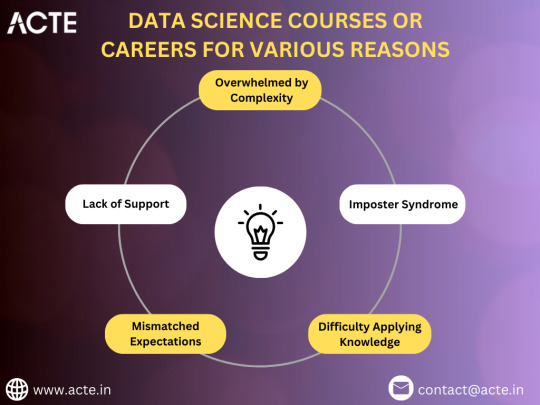
Difficulty applying knowledge
While understanding theoretical concepts is essential, the ability to apply that knowledge to solve real-world problems is equally important in data science. However, bridging the gap between theory and practice can be difficult for learners. Without opportunities to work on practical projects or gain hands-on experience, it can be difficult for learners to see the importance of what they are learning. The lack of tangible results or immediate feedback can be demotivating and hinder progress, causing some people to lose interest and give up on their data science journey. Enroll in a flexible and comprehensive Python online course today and unlock the skills you need to succeed in the digital age.
Conclusion: Navigating the Data Science Journey
Learning data science is undoubtedly challenging, but it is also very rewarding. By understanding the challenges learners face and exploring the reasons why people may drop out, we can support budding data scientists on their journey. Providing comprehensive resources, guidance, and hands-on experiences can help learners overcome technical barriers, combat impostor syndrome, and develop the skills and confidence needed to succeed in data science. With persistence and determination, anyone can unlock the exciting possibilities offered by data science and make their mark in this dynamic field.
#data science course#datascience#technology#data science certification#data science training#tech#education#data analytics#data visualization#python#big data
0 notes
Text
Data Detectives: Unveiling the Secrets Hidden Within
Imagine yourself as a modern-day Sherlock Holmes, but instead of magnifying glasses and dusty crime scenes, you wield powerful computers and vast troves of digital data. This, in essence, is the captivating world of a data scientist.

The first step towards becoming a data scientist is to carefully combine learning, skill development, and practical experience. One way to do this is to enrol in a Data Science Course in Bangalore.
Their mission? To crack the code hidden within mountains of information, transforming seemingly random numbers into groundbreaking insights.
The Data Dig: Unearthing Buried Treasure
A data scientist's day begins with a thirst for discovery. They embark on a digital excavation, meticulously sifting through datasets, each one a potential treasure trove waiting to be unearthed. Their keen eye scrutinizes every detail, ensuring the data is clean and ready to be analyzed – like a detective meticulously examining a crime scene for clues.
Building the Case: Patterns and Predictions
Once the data is prepped, the data scientist transforms into a master codebreaker. Armed with statistical tools and a knowledge of machine learning, they uncover hidden patterns and connections within the data. These patterns, like fingerprints at a crime scene, hold the key to solving the mysteries the data presents.
Experimentation: Putting the Pieces Together
But a good detective doesn't rely solely on hunches. The data scientist constantly tests and refines their theories, conducting experiments to validate their findings. This relentless pursuit of truth, achieved through A/B testing and hypothesis validation, strengthens their case and paves the way for data-driven decisions.
Painting a Picture: Sharing the Story
The data may speak for itself, but sometimes it needs a translator. Here, the data scientist dons the hat of a storyteller. They transform complex analyses into clear, compelling narratives, using data visualizations as their artistic tools. Interactive dashboards and insightful presentations become their canvas, painting a vivid picture for stakeholders to see, empowering them to act with confidence. To stay competitive, you must not only choose to learn continuously but also make use of resources like an Online Data Science Course.

The Data Squad: Collaboration is Key
No detective works alone, and neither does a data scientist. They collaborate with a diverse team – engineers, product managers, and business analysts – acting as a bridge between the technical world of data and the strategic world of business. Brainstorming sessions and teamwork fuel innovation, propelling the organization towards data-driven success.
Staying Sharp: A Lifelong Pursuit
The world of data science is constantly evolving, demanding a commitment to continuous learning. Data scientists are lifelong students, forever curious and eager to explore new techniques and tools. Online courses, workshops, and self-study become their training grounds, honing their skills and ensuring they remain at the forefront of their field.
Innovation at the Core: Shaping the Future
At the heart of every data scientist lies a passion for problem-solving and a drive to innovate. They are the architects of the future, using data-driven approaches to tackle complex challenges and unearth creative solutions. Through their relentless pursuit of knowledge and groundbreaking discoveries, they shape the future of organizations, propelling them towards success in a data-driven world.
This rephrased version uses a different tone and narrative style to present the information. It relies more on metaphors and comparisons to make the content engaging and interesting for a broader audience.
#data science course#datascience#technology#data science certification#data science training#tech#education#data analytics#data visualization#python
0 notes
Text
Crafting Your Journey: Essential Steps to Becoming a Data Scientist
In an era defined by data-driven decision-making, the role of a data scientist has emerged as one of the most sought-after positions across industries. Data scientists possess the unique ability to extract valuable insights from complex datasets, enabling organizations to make informed choices and drive innovation. If you're considering a career in data science, you're embarking on an exciting journey filled with opportunities for growth and impact.

The first step towards becoming a data scientist is to carefully combine learning, skill development, and practical experience. One way to do this is to enrol in a Data Science Course in Bangalore.
In this comprehensive guide, we'll outline the essential steps to help you navigate the path to becoming a proficient data scientist.
1. Education: Establishing a Strong Academic Foundation
A solid educational background lays the groundwork for success in data science. While degrees in computer science, mathematics, or statistics are common among data scientists, individuals from diverse academic backgrounds can excel in the field. Whether you pursue a bachelor's, master's, or Ph.D., a strong academic foundation provides the necessary knowledge and skills to thrive in data science.
2. Programming Skills: Mastering the Language of Data
Proficiency in programming languages is a cornerstone of data science. Python, R, and SQL are among the most widely used languages in the field, offering powerful tools for data manipulation, analysis, and visualization. By mastering these languages, you'll gain the ability to extract actionable insights from raw data and communicate your findings effectively.
3. Statistics and Mathematics: Understanding the Language of Data
A deep understanding of statistics and mathematics is essential for interpreting data and drawing meaningful conclusions. Concepts such as probability, hypothesis testing, and linear algebra form the basis of statistical analysis in data science. By honing your skills in these areas, you'll be equipped to uncover patterns, trends, and relationships within datasets.
4. Machine Learning and Data Analysis: Exploring Advanced Techniques
Machine learning lies at the heart of many data science applications, enabling predictive modeling, pattern recognition, and decision-making. Familiarity with machine learning algorithms, such as regression, classification, and clustering, empowers data scientists to build robust models and derive actionable insights from data. Additionally, proficiency in data analysis techniques, such as exploratory data analysis (EDA) and feature engineering, enhances your ability to extract valuable information from diverse datasets.
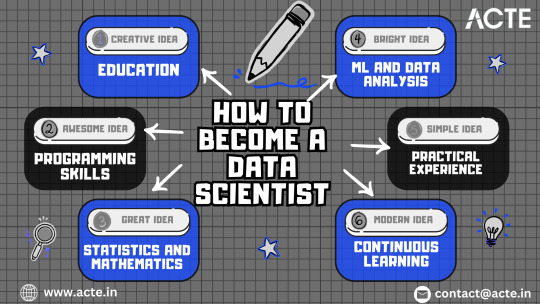
To stay competitive, you must not only choose to learn continuously but also make use of resources like an Online Data Science Course.
5. Practical Experience: Applying Theory to Real-World Challenges
Hands-on experience with real-world data is invaluable for honing your data science skills. Internships, personal projects, and participation in data science competitions provide opportunities to tackle complex problems, work with diverse datasets, and apply theoretical knowledge to practical challenges. By immersing yourself in real-world projects, you'll gain the practical skills and confidence needed to excel as a data scientist.
6. Continuous Learning: Staying Ahead in a Dynamic Field
The field of data science is constantly evolving, driven by advancements in technology and new methodologies. Continuous learning is essential for staying abreast of the latest trends, tools, and techniques in data science. Online courses, workshops, and professional development programs offer avenues for expanding your skill set and staying competitive in the ever-changing landscape of data science.
In conclusion, the journey to becoming a proficient data scientist is characterized by education, skills development, practical experience, and a commitment to lifelong learning. By following this roadmap and embracing opportunities for growth and development, you'll be well-equipped to make meaningful contributions in the field of data science and embark on a rewarding career path filled with opportunities for innovation and impact.
#data science course#datascience#technology#data science certification#data science training#tech#education#data analytics#data visualization#python
0 notes
Text
Data-Driven Decision Making: Empowering Organizations
In today's interconnected world, data science stands as a beacon of innovation, offering transformative solutions that redefine how businesses operate and interact with customers. With its versatile applications spanning across industries, data science has become indispensable for organizations seeking to unlock the potential of their data assets. This comprehensive exploration will delve into the multifaceted capabilities of data science, showcasing its ability to drive strategic decision-making, enhance customer experiences, and propel industries forward.
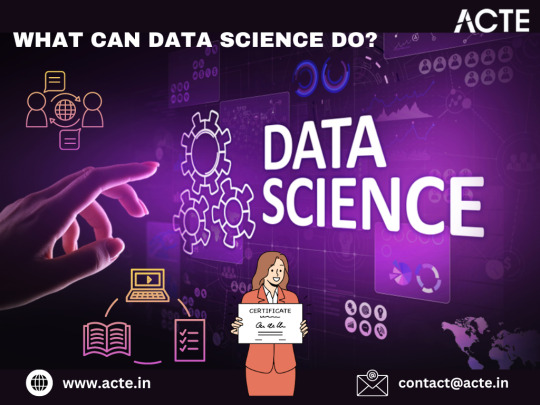
Starting the path to become a data scientist, for example by registering for a Data Science Course in Chennai, entails a calculated fusion of learning, developing skills, and getting hands-on experience.
Unveiling Data Science's Potential:
Enhanced Decision Making:
In the age of information overload, data science empowers organizations to sift through vast amounts of data and extract actionable insights. By harnessing sophisticated analytics techniques, businesses can make data-driven decisions that optimize processes, mitigate risks, and capitalize on emerging opportunities.
Empowering Customer Experiences:
Personalization has become a cornerstone of modern customer experiences, and data science lies at the heart of this paradigm shift. By leveraging advanced algorithms and predictive modeling, businesses can tailor products, services, and marketing efforts to meet the unique needs and preferences of individual customers.
Ensuring Financial Security:
Fraudulent activities pose a significant threat to businesses across various sectors, but data science provides a formidable defense. Through anomaly detection, pattern recognition, and real-time monitoring, organizations can detect and prevent fraud before it causes substantial financial losses. Continuous learning, facilitated by resources such as a Data Science Course Online is not just a choice but a necessity to remain competitive.

Transforming Healthcare Delivery:
In the healthcare industry, data science is revolutionizing patient care delivery, clinical decision-making, and medical research. From predictive analytics that identify high-risk patients to image analysis algorithms that aid in disease diagnosis, data science holds the promise of improving health outcomes and driving medical innovation.
Advancing Human-Machine Interaction:
Natural Language Processing (NLP) and computer vision technologies are pushing the boundaries of human-machine interaction. By enabling computers to understand, interpret, and generate human language and visual information, data science is facilitating more seamless communication and collaboration between humans and machines.
Driving Supply Chain Efficiency:
Supply chain management is undergoing a digital transformation, thanks to the insights provided by data science. By analyzing supply chain data in real-time, organizations can optimize inventory levels, streamline logistics operations, and improve overall efficiency and resilience.
Conclusion:
In conclusion, data science is not just a buzzword—it's a game-changer that has the potential to reshape industries and revolutionize the way we live and work. From enhancing decision-making and customer experiences to safeguarding financial security and advancing healthcare, the applications of data science are vast and varied. By embracing data science and harnessing its power, organizations can gain a competitive edge, drive innovation, and create value in today's data-driven world.
#data science course#datascience#technology#data science certification#data science training#tech#education#data analytics#data visualization#python
0 notes
Text
Embracing the World of Data Science: A Personal Odyssey
In today's fast-evolving digital landscape, data science stands as a beacon of innovation, offering a captivating blend of intellectual challenge, real-world impact, and endless opportunities for growth. As I embarked on my journey into this dynamic field, I found myself drawn to its multifaceted nature and its potential to drive transformative change across industries.

Here's a deeper dive into the reasons why I chose to immerse myself in the world of data science:
Intellectual Stimulation: The allure of data science lies in its unparalleled capacity to engage the mind. It demands a synthesis of analytical prowess, mathematical aptitude, and coding finesse to unlock the insights hidden within vast and complex datasets. For me, the prospect of delving into challenging problems and unraveling their intricacies through data-driven approaches is both exhilarating and intellectually fulfilling.
Real-world Impact: Beyond the realm of academia, data science holds immense potential to make a tangible difference in the world. From revolutionizing healthcare delivery to optimizing financial strategies and informing targeted marketing campaigns, the applications of data science are boundless. The opportunity to contribute to solutions that address pressing societal issues and drive innovation in diverse sectors resonates deeply with my desire to effect positive change through my work.
Continuous Learning: The field of data science is a perpetual learning journey, characterized by rapid advancements and constant innovation. Keeping pace with the latest algorithms, methodologies, and technologies is not merely a professional obligation but a source of genuine excitement and curiosity. Whether exploring cutting-edge machine learning techniques or diving into the intricacies of data visualization, every new discovery fuels my passion for continuous growth and development.

Creative Exploration: At its core, data science is as much an art as it is a science. It encourages creative thinking and innovative problem-solving, inviting practitioners to approach challenges from novel perspectives and devise elegant solutions. Whether devising predictive models to forecast market trends or designing algorithms to optimize resource allocation, the freedom to explore and experiment fosters a spirit of creativity and ingenuity that fuels my enthusiasm for the field.
Versatility of Career Paths: One of the most appealing aspects of data science is its versatility, offering a myriad of career pathways to suit a diverse range of interests and aspirations. Whether specializing in machine learning, data engineering, or business analytics, data scientists have the flexibility to carve out their niche and pursue their passions. This inherent adaptability not only ensures a fulfilling and dynamic career but also empowers individuals to chart their own course and shape their professional trajectory according to their unique talents and ambitions.
Global Relevance: In an increasingly interconnected world, the demand for data science expertise knows no bounds. From Silicon Valley startups to multinational corporations and non-profit organizations, data scientists are sought after for their ability to extract actionable insights from data and drive informed decision-making. This global relevance not only broadens the scope of opportunities available but also fosters a sense of connectedness and collaboration within the global data science community.
In essence, my decision to pursue a career in data science was driven by a convergence of factors: the intellectual challenge it offers, the real-world impact it enables, the opportunities for continuous learning and growth, the freedom for creative exploration, the versatility of career paths, and its global relevance. Embracing the world of data science has not only ignited my passion for discovery and innovation but also opened doors to a future filled with endless possibilities and meaningful contributions to society.
#data science course#datascience#technology#data science certification#data science training#tech#education
1 note
·
View note
Text
Decoding Data Careers: Data Science vs. Data Analytics
In today's data-driven landscape, the fields of data science and data analytics have emerged as pivotal disciplines, each playing a crucial role in leveraging the power of data for informed decision-making. While both fields revolve around extracting insights from data, they differ significantly in scope, focus, and required expertise. In this comprehensive guide, we'll delve into the distinctions between data science and data analytics, helping you navigate your career path in the dynamic world of data.

Understanding Data Science:
Data science encompasses a broad range of tasks aimed at extracting actionable insights from complex datasets. Data scientists leverage advanced statistical techniques, machine learning algorithms, and programming skills to tackle open-ended questions and drive strategic decision-making within organizations. From data collection and cleaning to analysis, modeling, and interpretation, data science covers the entire spectrum of data-related processes.
Advantages of Data Science:
Comprehensive Skill Set: Data scientists possess a diverse skill set, including proficiency in programming languages (e.g., Python, R), statistical analysis, machine learning, and data visualization.
Predictive Analytics: Data science focuses on building predictive models to forecast future trends, identify patterns, and make data-driven predictions.
Complex Problem-Solving: Data scientists tackle complex and ambiguous problems, requiring creative solutions and innovative approaches.
Strategic Decision-Making: Data scientists play a crucial role in informing strategic decisions within organizations by providing actionable insights and recommendations based on data analysis.

Exploring Data Analytics:
In contrast, data analytics primarily focuses on analyzing past and current data to uncover meaningful patterns, trends, and correlations. Data analysts utilize statistical techniques, data mining, and visualization tools to extract insights and communicate findings to stakeholders. They are often involved in generating reports, dashboards, and data visualizations to facilitate decision-making processes.
Advantages of Data Analytics:
Specialized Focus: Data analytics offers a narrower focus on analyzing existing data to derive insights and inform business decisions.
Reporting and Visualization: Data analysts excel in creating visually appealing reports, dashboards, and data visualizations to communicate insights effectively.
Business Intelligence: Data analytics plays a crucial role in providing business intelligence and aiding in operational decision-making.
Data-Driven Insights: Data analysts focus on extracting insights from data to optimize processes, improve performance, and drive business outcomes.
Choosing Your Path:
When deciding between data science and data analytics, individuals should consider their interests, strengths, and career objectives. Data science is ideal for those who enjoy working with complex data sets, have a strong mathematical background, and possess programming skills. On the other hand, data analytics may be a better fit for individuals interested in analyzing data to derive insights, create reports, and support operational decision-making.
In Summary:
Both data science and data analytics are invaluable disciplines with distinct roles and applications in the data-driven world. The choice between the two depends on individual preferences, career aspirations, and the specific needs of organizations. Whether you opt for data science or data analytics, pursuing either field can lead to rewarding and impactful careers in the rapidly growing field of data analysis and interpretation.
By understanding the differences between data science and data analytics, you can make an informed decision about which path aligns best with your skills, interests, and career goals. Whichever path you choose, the world of data offers endless opportunities for growth, innovation, and professional advancement. So, embark on your journey into the world of data with confidence and curiosity, knowing that you are shaping the future of information and decision-making in a data-driven society.
#data science course#datascience#technology#data science certification#data science training#tech#data analytics#education#data visualization
1 note
·
View note
Text
The Transformative Power of Data Science Courses: Empowering Students for Success
In today's data-centric world, the realm of data science has emerged as a vital avenue for students seeking to excel in diverse industries. Enrolling in a data science course not only equips students with indispensable skills but also paves the way for lucrative career opportunities. Let's delve into the multifaceted advantages that data science courses offer to students looking to thrive in the modern era of data-driven decision-making.

1. Highly Sought-After Expertise: The demand for proficient data scientists spans across industries, making mastery in data science an invaluable asset. By undertaking a data science course, students acquire proficiency in statistical analysis, machine learning, data visualization, and more, positioning themselves as highly sought-after professionals in the job market.
2. Lucrative Career Pathways: One of the most compelling aspects of pursuing a data science course is the plethora of career avenues it unveils. From technology behemoths to financial institutions, healthcare conglomerates to marketing agencies, data scientists are in high demand across sectors. With competitive compensation packages and abundant room for advancement, data science offers students the promise of fulfilling and financially rewarding careers.
3. Enhanced Problem-Solving Abilities: Data science courses are meticulously designed to sharpen students' analytical and problem-solving skills. Through immersive projects and case studies, students learn to extract actionable insights from data, discern patterns, and make well-informed decisions. These competencies are not only invaluable in the realm of data science but also transferable to myriad other professions.
4. Adaptability and Versatility: The principles and methodologies taught in data science courses transcend industry boundaries, rendering them universally applicable. Whether it's finance, healthcare, retail, or any other sector, data science skills are indispensable. This adaptability empowers students to pursue careers across diverse domains, offering them a wide spectrum of opportunities.
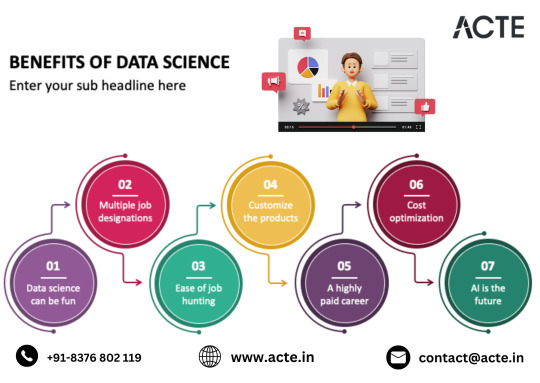
5. Fostering Innovation and Creativity: Data science courses foster a culture of innovation and ingenuity, encouraging students to explore novel solutions to complex problems. Through hands-on projects and experimentation with various algorithms and techniques, students cultivate a creative mindset crucial for navigating the ever-evolving landscape of data science.
6. Networking and Collaboration Opportunities: Many data science courses provide platforms for students to network with industry professionals, mentors, and peers. Building connections in the field can lead to internships, job placements, and collaborative endeavors, enriching students' learning experiences beyond the confines of the classroom.
7. Commitment to Lifelong Learning: Data science is an ever-evolving field, characterized by continuous innovation and advancement. Enrolling in a data science course ensures that students stay abreast of the latest trends, tools, and techniques, thereby enhancing their competitiveness in the job market and preparing them for the challenges of the future.
In summary, data science courses serve as catalysts for students' success in today's data-driven world. By acquiring sought-after skills, exploring diverse career prospects, honing problem-solving abilities, fostering creativity, and embracing a mindset of lifelong learning, students are empowered to chart a course for success in the dynamic realm of data science. Whether embarking on a career as a data scientist or leveraging their skills in other professional domains, the benefits of a data science course are boundless, offering students a pathway to a bright and prosperous future.
#data science course#datascience#technology#data science certification#data science training#education#tech#data analytics
0 notes
Text
Unveiling the Significance of Data Science: A Roadmap to Success in the Digital Era
In today's technologically-driven world, the prominence of data science cannot be overstated. As businesses and industries increasingly rely on data to fuel decision-making processes and drive innovation, the need for proficient data scientists has skyrocketed. This blog aims to delve into the compelling reasons why learning data science is not just beneficial, but crucial in the contemporary digital landscape.

1. Valuable Skillset in High Demand: Data science skills are highly sought-after across diverse industries, making them a valuable asset for individuals seeking to enter or advance within the job market. Numerous reports and studies consistently rank data scientist roles among the top positions with promising career prospects. The ability to analyze data, extract insights, and make informed decisions has become indispensable for businesses striving to gain a competitive advantage.
2. Abundance of Lucrative Career Paths: One of the most compelling incentives to learn data science is the plethora of lucrative career opportunities it offers. Data scientists command competitive salaries and enjoy a plethora of job openings across various sectors, including technology, finance, healthcare, e-commerce, and more. As businesses increasingly adopt data-driven strategies to propel growth and innovation, the demand for skilled data scientists continues to surge, resulting in a favorable job market for those proficient in the field.
3. Versatility and Adaptability: Data science skills are versatile and applicable across a myriad of industries and domains. Whether one's interests lie in finance, healthcare, marketing, or any other field, data science proficiency can be harnessed to solve complex problems and drive data-informed decisions. From analyzing consumer behavior to optimizing supply chains, data science offers boundless opportunities for innovation and enhancement across diverse sectors.
4. Driving Force behind Innovation: Data science serves as a catalyst for innovation, pushing the boundaries of what is achievable. By delving into vast datasets, data scientists can uncover hidden patterns, trends, and insights that inform strategic decision-making and fuel business growth. From developing predictive models to crafting personalized recommendations, data science fuels innovation by providing organizations with invaluable insights into consumer behavior, market trends, and emerging opportunities.

5. Empowering Informed Decision Making: In today's data-centric landscape, data-driven decision making is imperative for business success. Data science expertise empowers individuals to analyze data, identify trends, and derive actionable insights that guide strategic decision-making. By leveraging data science techniques such as predictive modeling, machine learning, and data visualization, businesses can gain valuable insights into their operations, customer preferences, and market dynamics, enabling them to make data-driven decisions that drive growth and profitability.
6. Continuous Personal and Professional Development: Embarking on a journey to learn data science can lead to significant personal and professional growth. As a rapidly evolving field, data science offers ample opportunities for continuous learning and skill development, enabling individuals to stay abreast of emerging trends and technologies. Whether one is a seasoned professional seeking career advancement or a newcomer eager to enter the field, acquiring data science skills can unlock new opportunities and propel personal and professional growth.
7. Contributing to Positive Social Impact: Beyond personal and professional benefits, data science has the potential to drive positive social change. By applying data science techniques to address societal challenges such as healthcare disparities, environmental sustainability, and urban planning, data scientists can make a meaningful difference in the world. Whether it entails enhancing healthcare outcomes through predictive analytics or optimizing resource allocation through data-driven decision-making, data science holds the power to drive positive change and enhance the quality of life for individuals worldwide.
In conclusion, learning data science offers a multitude of benefits, from unlocking lucrative career paths to driving innovation and fostering positive societal impact. As organizations increasingly embrace data-driven strategies, the demand for skilled data scientists will only continue to grow. Whether one is a seasoned professional or a newcomer to the field, investing in data science education can be a strategic decision that paves the way for long-term success and fulfillment in the digital age.
#data science course#technology#datascience#data science certification#data science training#education#tech
1 note
·
View note
Text
Harnessing the Power of Data: Envisioning the Future of Data Science
In today's data-centric environment, data science stands as a beacon of innovation, facilitating the extraction of invaluable insights from complex datasets. As technology progresses and data volumes swell, the future of data science holds vast potential. This blog delves into the evolving landscape of data science, highlighting trends, advancements, and opportunities shaping its trajectory.
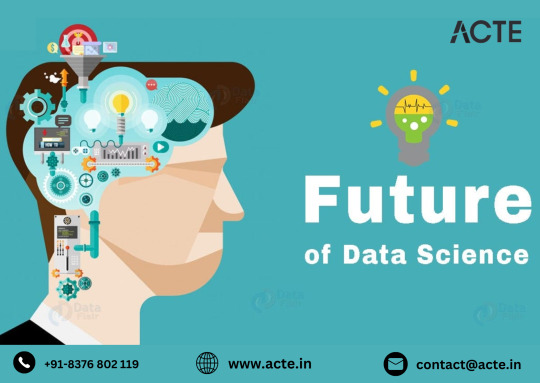
1. Defining Data Science: Data science encompasses a multidisciplinary approach, integrating techniques, algorithms, and methodologies to derive insights from data. Drawing from fields like statistics, mathematics, and computer science, it uncovers patterns, trends, and relationships within datasets, driving informed decision-making.
2. Technological Progression: Advancements in technology, particularly in artificial intelligence (AI), machine learning (ML), and big data analytics, are propelling data science forward. These innovations enable more sophisticated data analysis, predictive modeling, and task automation, enhancing efficiency and accuracy.
3. Big Data Explosion: The proliferation of digital platforms, devices, and sensors has led to an explosion of data. Data scientists play a pivotal role in harnessing this wealth of information to fuel business growth, optimize operations, and enhance customer experiences.
4. AI and Machine Learning Impact: AI and machine learning are transformative forces within data science, empowering systems to learn from data patterns autonomously. As these technologies mature, their applications across sectors like healthcare, finance, and marketing are set to expand exponentially.

5. Data Privacy and Ethics: As data becomes increasingly valuable, safeguarding privacy and upholding ethical standards are imperative. Data scientists must adhere to stringent regulations and ethical guidelines to preserve individuals' privacy and prevent misuse of sensitive information.
6. Collaborative Endeavors: Data science thrives on collaboration, bringing together diverse expertise from data scientists, domain specialists, and stakeholders. By fostering interdisciplinary collaboration, the field can tackle complex challenges and drive innovative solutions.
7. Lifelong Learning and Development: In the fast-paced realm of data science, continuous learning and skill development are essential. Online courses, workshops, and certifications empower professionals to stay updated with emerging trends and technologies, ensuring they remain at the forefront of the field.
Conclusion: In conclusion, the future of data science holds immense promise. With ongoing technological advancements, burgeoning data volumes, and increasing demand for data-driven insights, the field presents abundant opportunities for innovation and growth. By embracing collaboration, upholding ethical standards, and committing to lifelong learning, data scientists can navigate the evolving landscape and drive positive change in diverse industries and sectors.
#data science course#datascience#technology#data science certification#data science training#tech#education#data analytics
0 notes
Text
Solving Tomorrow's Challenges: The Role of Data Science in Problem-Solving
In today's digital era, delving into the realm of data science yields a plethora of benefits and opportunities. From uncovering valuable insights to propelling innovation, the study of data science holds immense promise for individuals aiming to make a significant impact across diverse industries. This comprehensive blog aims to dissect the myriad advantages of studying data science and how it can pave the way for a gratifying and prosperous career.

1. Unveiling the Potential of Data
At its essence, data science revolves around harnessing the potential of data to extract actionable insights and guide informed decision-making. By immersing oneself in data science studies, individuals acquire the skills and expertise necessary to analyze intricate datasets, discern patterns, and derive meaningful conclusions. This capability to extract valuable information from data is invaluable in today's data-centric landscape, where businesses rely on data-driven strategies to gain a competitive edge and drive organizational growth.
2. Meeting the Surging Demand for Data Experts
The demand for proficient data professionals has soared in recent years, with organizations across various sectors recognizing the significance of data-driven insights. By pursuing studies in data science, individuals position themselves at the forefront of this escalating demand, unlocking a plethora of career prospects in fields such as technology, finance, healthcare, e-commerce, and beyond. Whether assuming roles as data analysts, data engineers, or data scientists, graduates of data science programs are highly coveted by employers seeking to leverage data for strategic decision-making and innovation.
3. Fueling Innovation and Progress
Data science serves as a catalyst for innovation and progress across industries, reshaping business operations and enhancing customer experiences. From personalized recommendations in online retail to predictive maintenance in manufacturing, data science methodologies drive optimization, efficiency, and innovation. Through the study of data science, individuals acquire the skills and insights necessary to contribute to these transformative endeavors, shaping the future of technology and fostering positive societal change.

4. Tackling Complex Challenges
One of the most compelling aspects of delving into data science is the opportunity to tackle intricate and multifaceted challenges head-on. Whether it entails analyzing healthcare data to improve patient outcomes or detecting fraudulent activities in financial transactions, data science empowers individuals to address real-world problems with data-driven solutions. Through data science studies, individuals cultivate critical thinking abilities and problem-solving acumen that transcend disciplinary boundaries, rendering them invaluable assets in any organizational setting.
5. Enabling Informed Decision-Making
In today's fast-paced business landscape, making informed decisions swiftly is paramount for sustained success. By immersing oneself in the study of data science, individuals learn to harness data effectively to inform decision-making processes. Whether optimizing marketing endeavors, projecting sales trends, or identifying avenues for cost reduction, data-driven decision-making emerges as a potent tool for driving organizational prosperity. Through data science studies, individuals equip themselves with the competencies and insights required to leverage data for strategic advantage and business growth.
6. Driving Social Impact
Beyond its commercial applications, data science holds the potential to catalyze positive societal change by addressing pressing social challenges. Whether it involves scrutinizing public health data to combat disease outbreaks or leveraging data to enhance access to education and healthcare, data science emerges as a force for societal betterment. By engaging in data science studies, individuals have the opportunity to contribute to these endeavors and effect meaningful change on a global scale.
Conclusion
In conclusion, embarking on a journey into data science offers a myriad of benefits, from unlocking insights and fostering innovation to addressing complex challenges and driving positive societal impact. With the demand for skilled data professionals soaring, there has never been a more opportune time to pursue studies in data science. Whether aiming to kickstart a new career or augment existing skill sets, delving into data science studies opens doors to a wealth of opportunities and sets the stage for a fulfilling and prosperous professional trajectory.
1 note
·
View note
Text
Networking in Data Science: Building Connections for Success
In the contemporary world driven by data, data science emerges as a field teeming with opportunities for individuals with a penchant for problem-solving and innovation. Whether you're charting a new career path or seeking to augment your existing skill set, delving into data science promises a wealth of possibilities. This exhaustive guide aims to illuminate the pathway to success in data science, offering actionable steps to help you carve out a gratifying career in this dynamic domain.
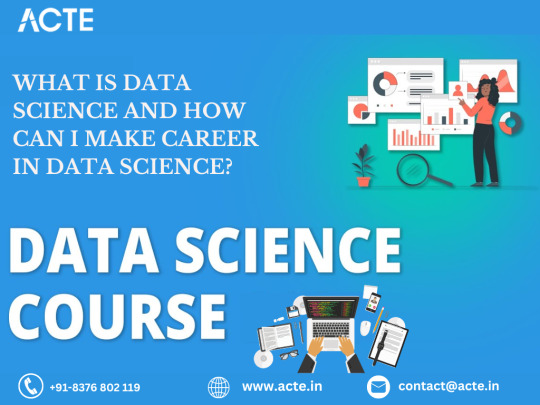
1. Establishing a Firm Groundwork: The Bedrock of Achievement
At the onset of your data science expedition, laying a sturdy foundation in fundamental concepts is imperative. Here's how you can kickstart your journey:
Master Core Skills: Begin by honing your expertise in mathematics, statistics, and programming languages such as Python, R, and SQL. These fundamental skills serve as the scaffolding upon which your data science journey will unfold.
Acquire Hands-On Experience: Theory alone can only take you so far. Engage in real-world projects, tackle datasets, and grapple with data-centric challenges. Whether through online contests, open-source contributions, or internships, practical experience is the linchpin of your growth as a data scientist.
2. Specialization: Paving Your Path in the Data Cosmos
As you delve deeper into the nuances of data science, consider specializing in specific domains aligned with your interests and career aspirations:
Explore Varied Domains: From machine learning and deep learning to natural language processing and big data analytics, the realm of data science offers a plethora of avenues for exploration. Take the time to delve into diverse areas and identify your passion.
Refine Your Focus: Once you've sampled various domains, narrow down your focus to one or more areas of specialization. Whether it involves crafting predictive models, dissecting textual data, or unraveling the complexities of big data, specialization enables you to deepen your expertise and carve out a niche for yourself.
3. Embracing Lifelong Learning: Staying at the Vanguard
In a domain as dynamic as data science, continuous learning isn't merely a choice – it's a prerequisite for success. Here's how you can stay abreast of the latest trends and advancements:
Engage in Ongoing Education: Enroll in online courses, workshops, and bootcamps to broaden your skill set and stay abreast of emerging technologies and methodologies. Platforms like Coursera, edX, and Udacity offer a wealth of resources to support your learning journey.
Participate in Professional Communities: Join data science communities, attend meetups, and participate in online forums to connect with like-minded professionals, share insights, and stay abreast of industry developments. Networking is invaluable in fostering growth and keeping pace with the ever-evolving landscape of data science.

4. Showcasing Your Talent: Establishing Your Brand as a Data Scientist
In a competitive job market, distinguishing yourself from the crowd is essential. Here's how you can showcase your skills and expertise effectively:
Craft a Compelling Portfolio: Develop a portfolio showcasing your projects, analyses, and achievements. Platforms like GitHub and Kaggle provide ideal avenues for sharing your work and demonstrating your proficiency to potential employers.
Optimize Your Online Presence: Create a polished resume and LinkedIn profile that highlight your technical skills, experience, and accomplishments in data science. Leverage social media platforms to engage with industry professionals and showcase your passion for the field.
5. Navigating the Job Market: Pursuing Opportunities in Data Science
Armed with a solid foundation and specialized expertise, it's time to embark on your job search journey:
Tailor Your Applications: Customize your job applications to align with the requirements of each role you're applying for. Emphasize relevant skills, experiences, and projects that demonstrate your suitability for the position.
Prepare for Interviews: Brush up on your technical knowledge and be prepared to tackle data science-related interview questions. Practice coding challenges, case studies, and behavioral interviews to ensure you're well-prepared to impress potential employers.
6. Embracing Growth and Evolution: Thriving in the Data Science Arena
In the ever-evolving landscape of data science, adaptability is key to long-term success:
Stay Curious: Maintain a thirst for knowledge and a willingness to explore new ideas and technologies. The field of data science is constantly evolving, and nurturing curiosity ensures you remain at the forefront of innovation.
Embrace Challenges: Don't shy away from tackling complex problems and venturing beyond your comfort zone. Embracing challenges fosters growth and resilience, ultimately propelling you toward greater heights in your data science career.
Conclusion
Embarking on a career in data science is a journey teeming with excitement, discovery, and growth. By establishing a strong foundation, specializing in your chosen domain, embracing lifelong learning, showcasing your talents, and navigating the job market with confidence, you can chart a course toward a fulfilling and rewarding career in this dynamic field. As you embark on this exhilarating odyssey, remember to stay curious, stay resilient, and above all, stay passionate about the boundless possibilities that data science has to offer.
#data science course#datascience#technology#data science certification#data science training#education#tech#data analytics
0 notes
Text
Exploring the Advantages of Learning Data Science: A Comprehensive Overview
In today's digital era, the realm of Data Science stands as a beacon of opportunity, offering a multitude of benefits to those who embark on the journey of learning its intricacies. This thorough guide illuminates the myriad advantages of delving into Data Science and examines the anticipated evolution of this dynamic field in the years to come.

Introduction: Navigating the Data-driven Landscape
In the contemporary landscape, data has emerged as the cornerstone of decision-making, innovation, and progress. Across diverse sectors, organizations rely on data-driven insights to chart their course, anticipate trends, and gain a competitive edge. At the nexus of this data revolution lies Data Science—an interdisciplinary domain that melds statistics, computer science, machine learning, and domain expertise. By mastering the tools and methodologies of Data Science, individuals gain the power to decipher complex datasets, derive actionable insights, and drive transformative change.
Benefits of Learning Data Science: Unlocking Potential
Promising Career Opportunities: A compelling incentive to delve into Data Science is the abundance of career prospects it presents. With businesses increasingly embracing data-driven strategies, the demand for skilled Data Scientists has skyrocketed. From startups to Fortune 500 companies, organizations are actively seeking professionals capable of harnessing data to fuel innovation and propel growth.
Versatility and Flexibility: Data Science skills transcend industry boundaries, offering practitioners the freedom to navigate diverse domains—from finance and healthcare to marketing and beyond. This versatility empowers individuals to sculpt their career trajectories according to their passions and expertise, fostering a sense of fulfillment and purpose in their professional endeavors.
Problem-solving Prowess: At its core, Data Science is a discipline rooted in problem-solving. Whether it's predicting consumer behavior, optimizing operational processes, or detecting anomalies, Data Scientists are equipped with the analytical acumen to tackle multifaceted challenges head-on. By leveraging data-driven methodologies, individuals can catalyze innovation and drive tangible outcomes.
Continuous Learning and Growth: The landscape of Data Science is perpetually evolving, with new techniques, algorithms, and technologies emerging incessantly. Mastery of Data Science entails a commitment to lifelong learning—a journey marked by continual upskilling, exploration of emerging trends, and adaptation to evolving methodologies. By embracing this ethos of perpetual growth, practitioners can remain at the vanguard of innovation and expertise.
Catalyst for Innovation: Data Science serves as a catalyst for innovation, propelling breakthroughs in artificial intelligence, machine learning, and predictive analytics. From revolutionizing healthcare diagnostics to optimizing supply chain logistics, Data Science fuels transformative advancements that shape the contours of our digital world. By fostering a culture of experimentation and ingenuity, practitioners drive progress and redefine the boundaries of possibility.
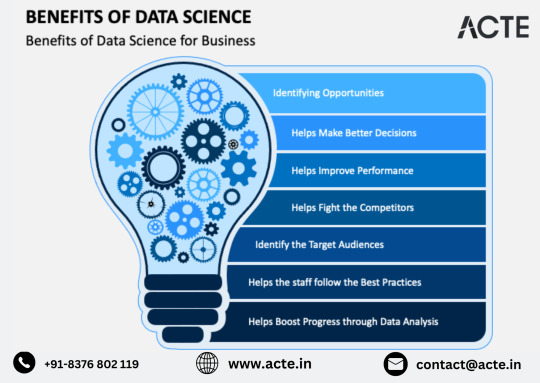
The Future of Data Science: A Glimpse Ahead
AI and Machine Learning Integration: As artificial intelligence and machine learning technologies mature, they will assume an increasingly central role in the Data Science landscape. Advanced algorithms and predictive models will usher in a new era of predictive analytics, enabling organizations to glean deeper insights and make more informed decisions.
Ethical Data Governance: With mounting concerns surrounding data privacy and ethical considerations, Data Science will witness a heightened focus on responsible data governance. Practitioners will be tasked with upholding ethical standards and regulatory compliance, ensuring the ethical handling and utilization of data assets.
Edge Computing and IoT Advancements: The proliferation of Internet of Things (IoT) devices and edge computing infrastructure will fuel the generation of vast datasets at the edge of networks. Data Science will evolve to accommodate the unique challenges and opportunities presented by edge computing, enabling real-time analytics and actionable insights.
Interdisciplinary Collaboration: Data Science will increasingly intersect with diverse disciplines—from psychology and sociology to economics and beyond. Collaborative endeavors between Data Scientists and domain experts will yield synergistic solutions, enriching our understanding of complex phenomena and driving innovation at the intersection of disciplines.
Advancements in Data Visualization: Data visualization will undergo a renaissance, with the advent of sophisticated techniques and tools that facilitate intuitive and interactive exploration of complex datasets. Enhanced visualization capabilities empower stakeholders to derive deeper insights from data, fostering informed decision-making and driving organizational success.
In conclusion, the pursuit of Data Science education offers a gateway to a realm of boundless opportunity and innovation. Whether you're an aspiring professional or a seasoned practitioner, the benefits of delving into Data Science are manifold—from promising career prospects to the thrill of solving complex challenges and shaping the future of technology. As the field continues to evolve, embracing lifelong learning and staying attuned to emerging trends will be paramount. By harnessing the power of Data Science, individuals can chart a course towards success, innovation, and impact in an increasingly data-centric world.
#data science course#datascience#technology#data science certification#data science training#tech#education#data visualization
1 note
·
View note
Text
Exploring the Vast Landscape of Careers in Data Science: A Comprehensive Overview
In the contemporary era, where data reigns supreme, the demand for proficient professionals capable of extracting insights and value from data is reaching new heights. Data science has emerged as a pivotal field encompassing a diverse array of roles and responsibilities, each presenting its unique set of challenges and opportunities. In this article, we'll delve into the multifaceted spectrum of job opportunities within the realm of data science, ranging from data scientists and analysts to machine learning engineers and beyond.
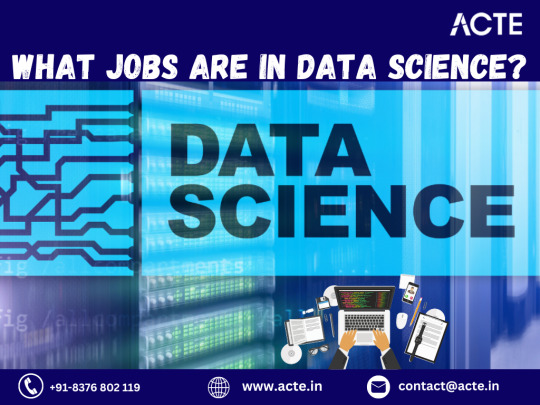
1. Data Scientist: Unveiling Insights from Data
At the forefront of the data science domain are data scientists, tasked with the collection, analysis, and interpretation of vast datasets to unveil actionable insights. They employ a blend of statistical analysis, machine learning algorithms, and programming expertise to solve intricate problems and drive informed decision-making across various industries, including finance, healthcare, e-commerce, and beyond.
2. Data Analyst: Discerning Trends and Patterns
Data analysts play a pivotal role in translating data into meaningful insights that inform business decisions. Their responsibilities encompass data gathering, cleansing, processing, and statistical analysis, culminating in the creation of visualizations to effectively communicate findings to stakeholders. Armed with a sharp analytical acumen, data analysts excel in identifying trends, patterns, and correlations within datasets.
3. Machine Learning Engineer: Crafting Intelligent Systems
Machine learning engineers specialize in the development of algorithms and systems that empower computers to learn and improve from experience autonomously. Their purview extends across a myriad of tasks, including natural language processing, image recognition, and recommendation systems. Leveraging sophisticated techniques such as deep learning and reinforcement learning, machine learning engineers drive innovation across diverse industries.
4. Business Intelligence Analyst: Driving Data-Driven Decisions
Business intelligence analysts leverage data to furnish insights into organizational performance and trends. They craft reports, dashboards, and data visualizations that empower executives and managers to make data-driven decisions and monitor key performance indicators. With a knack for transforming data into actionable insights, business intelligence analysts are instrumental in steering organizational success.
5. Data Engineer: Architecting Data Infrastructure
Data engineers are the architects behind the design, construction, and maintenance of systems and infrastructure pivotal for data collection, processing, and storage. They operate within the realms of large-scale databases, data pipelines, and distributed computing frameworks to ensure data accessibility, reliability, and security for analysis. Data engineers lay the foundational groundwork essential for data-driven decision-making within organizations.

6. Data Architect: Designing Data Systems for Optimal Performance
Data architects are tasked with designing the structure and organization of data systems tailored to meet organizational needs. They conceptualize data models, define standards, and oversee the implementation of databases and data warehouses. By safeguarding data quality, integrity, and scalability, data architects play a crucial role in facilitating effective data management and analysis.
7. Statistician: Unearthing Insights through Statistical Analysis
Statisticians employ statistical methods and techniques to analyze and interpret data, whether for research endeavors or business pursuits. They conceptualize experiments, devise sampling plans, and execute statistical tests to derive meaningful conclusions and predictions based on data. With their profound expertise in statistical analysis, statisticians serve as pivotal contributors to decision-making processes.
8. Data Mining Engineer: Extracting Value from Data Stores
Data mining engineers specialize in extracting valuable insights and patterns from extensive datasets through techniques such as clustering, classification, and association rule mining. They apply cutting-edge data mining algorithms and tools to discern trends, anomalies, and relationships within data stores. By distilling actionable insights from data, data mining engineers drive informed decision-making and business growth.
9. Quantitative Analyst (Quant): Applying Mathematical Rigor to Financial Markets
Quants leverage mathematical and statistical models to analyze financial markets, manage investment portfolios, and formulate trading strategies. They apply quantitative methodologies to assess risk, evaluate investment opportunities, and optimize trading performance. With their proficiency in quantitative analysis, quants play an instrumental role in the financial sector, shaping market dynamics and fostering innovation.
10. Predictive Modeler: Anticipating Future Trends
Predictive modelers develop and deploy statistical models to forecast future outcomes and trends based on historical data. They create predictive models for various applications, including customer behavior analysis, demand forecasting, and risk assessment. Leveraging predictive modeling techniques, predictive modelers enable organizations to anticipate future trends and proactively strategize.
In summary, the domain of data science offers a vast array of job opportunities, each demanding a unique blend of skills and expertise. Whether one's passion lies in data analysis, machine learning, or strategic decision-making, there exists a role in data science perfectly suited to individual interests and aspirations. As organizations continue to harness the power of data to drive innovation and growth, the demand for adept data science professionals will only continue to soar. Embrace the diverse opportunities afforded by data science and embark on a fulfilling career journey in this dynamic and ever-evolving field.
#data science course#datascience#technology#data science certification#data science training#tech#education#data analytics
1 note
·
View note
Text
From Start-ups to Giants: Diverse Industry Applications of Data Science
In the rapidly evolving landscape of technology and analytics, data science has emerged as the cornerstone of innovation and decision-making across various sectors in India. The burgeoning demand for skilled data scientists presents an expansive array of career opportunities throughout the country.
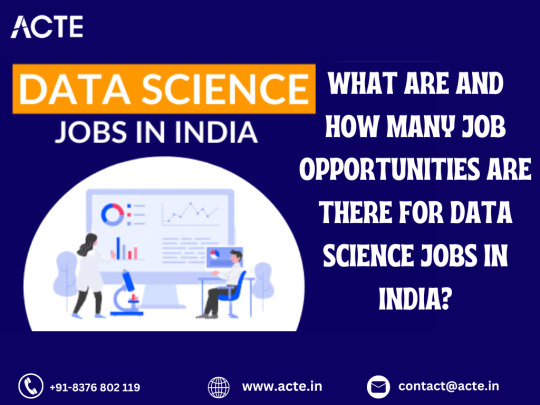
Let's delve deeper into the diverse avenues waiting to be explored in the realm of data science.
1. Diverse Industry Applications: Data science finds application in virtually every industry imaginable, from the e-commerce behemoths like Flipkart and Amazon to the financial powerhouses such as HDFC and ICICI. This diversity of industries translates into a wide spectrum of job roles catering to individuals with varied interests and expertise.
2. Thriving Start-up Ecosystem: India's start-up ecosystem is teeming with opportunities for data science enthusiasts. Start-ups across sectors like health tech, fintech, edtech, and agritech are harnessing data analytics to disrupt traditional markets and scale their businesses. This dynamic environment offers roles ranging from early-stage ventures to established unicorns, providing ample opportunities for growth and innovation.
3. Government Initiatives Driving Demand: Government initiatives like Digital India and Smart Cities Mission are driving the adoption of data-driven technologies to enhance governance and public services. This has created a surge in demand for data scientists in government organizations, research institutions, and think tanks, offering opportunities to contribute to meaningful societal impact.

4. Consulting Firms and Analytics Service Providers: Consulting firms and analytics service providers such as McKinsey, KPMG, and Mu Sigma are integrating data science into their offerings. They assist clients across industries in leveraging data for strategic decision-making, thereby sustaining a steady demand for data science professionals.
5. Academic and Research Opportunities: Academic institutions and research organizations play a pivotal role in advancing the field of data science through research and education. These institutions offer opportunities for data scientists to engage in cutting-edge research projects, mentor aspiring professionals, and collaborate with industry partners, fostering continuous learning and development.
6. Remote Work Flexibility: The advent of remote work has further expanded the horizons for data science professionals in India. Many global companies are hiring talent remotely, providing individuals with the flexibility to work from anywhere while contributing to impactful projects worldwide, breaking down geographical barriers and fostering a global community of data scientists.
In conclusion, the landscape of data science careers in India is brimming with opportunities across industries, sectors, and geographical locations. With the right skills, mindset, and adaptability, individuals can carve out fulfilling careers in this dynamic field and make meaningful contributions to organizations and society at large. Whether you're a seasoned professional or a budding enthusiast, the world of data science in India awaits your exploration and innovation.
#data science course#datascience#technology#data science certification#data science training#tech#education#data analytics#data visualization
1 note
·
View note
Text
Unleashing the Potential of Data Science: Exploring Its Diverse Advantages
In the dynamic realm of modern business, data science stands as a pivotal force, reshaping organizational strategies and redefining success. With its wide-ranging applications and transformative capabilities, data science offers a plethora of benefits that empower businesses to thrive in an ever-evolving landscape. This comprehensive blog post delves into the manifold advantages of data science and its profound impact on businesses across diverse industries.

1. Data-Driven Decision Making:
At the core of data science lies the ability to convert raw data into actionable insights. Through sophisticated analytics techniques, organizations can make informed decisions grounded in empirical evidence, steering away from reliance on intuition. Data-driven decision making enables businesses to spot opportunities, mitigate risks, and optimize operations for heightened efficiency and effectiveness.
2. Enhanced Efficiency and Productivity:
A key strength of data science lies in its capacity to automate tasks and streamline processes. By leveraging machine learning algorithms and predictive models, businesses can automate repetitive tasks, optimize resource allocation, and streamline workflows. This reduction in manual effort and error minimization translates into productivity enhancements and operational excellence.
3. Deeper Customer Understanding:
In the interconnected world of today, comprehending customer behavior is paramount to business success. Data science empowers organizations to sift through vast troves of customer data to extract actionable insights into preferences, buying patterns, and sentiments. Armed with this intelligence, businesses can segment their audience, customize marketing strategies, and deliver exceptional customer experiences conducive to loyalty and growth.
4. Predictive Analytics:
One of data science's most potent applications is predictive analytics, enabling organizations to foresee future trends and outcomes based on historical data. By constructing predictive models, businesses can anticipate demand, discern emerging market trends, and foresee customer needs. Predictive analytics equips organizations with the foresight necessary to proactively adapt to evolving market dynamics and outpace competitors.

5. Competitive Advantage:
In an increasingly competitive business landscape, those leveraging data science gain a significant edge over rivals. By leveraging data-driven insights to steer strategic decision-making and innovation, businesses can set themselves apart in the market, identify fresh avenues for growth, and surpass competitors. Data-driven insights empower organizations to remain agile, responsive, and resilient amid uncertainty.
6. Risk Mitigation:
Data science plays a pivotal role in risk management by enabling organizations to pinpoint and alleviate potential threats and vulnerabilities. Through techniques like anomaly detection and fraud analytics, businesses can uncover and deter fraudulent activities, curtail financial losses, and safeguard assets and reputation. Proactive risk management enables organizations to fortify operations and maintain stakeholder trust.
7. Business Growth and Innovation:
Ultimately, data science catalyzes business growth and innovation. By unveiling hidden patterns, unearthing unexplored opportunities, and unlocking fresh insights, data science fuels innovation and propels organizational growth. Whether by developing novel products and services, entering new markets, or refining existing processes, data-driven decision making empowers businesses to evolve and flourish in a swiftly evolving landscape.
In conclusion, data science signifies a fundamental shift in how businesses harness data to propel growth, innovation, and competitive advantage. By embracing data science tools and techniques, organizations can unleash the full potential of their data, make astute decisions, and generate value for customers and stakeholders alike. As data becomes increasingly ubiquitous and complex, the significance of data science in steering business success will continue to escalate.
#data science course#datascience#technology#data science certification#data science training#education#tech#data analytics#data visualization
0 notes
Text
Elevate Your Career with Data Science: A Path to Lucrative Salaries and Job Security
In an era marked by rapid digital transformation and technological advancements, data has emerged as the driving force behind innovation and strategic decision-making. At the forefront of this revolution lies the realm of data science, an interdisciplinary field that blends statistics, computer science, and domain expertise to extract actionable insights from vast datasets.

In this extensive guide, we will delve into the myriad benefits of acquiring skills in data science and examine the diverse career pathways it unlocks in today's data-centric landscape.
High Demand Across Industries
The primary allure of learning data science stems from its widespread demand across various sectors. Virtually every industry, from technology and finance to healthcare and marketing, relies heavily on data-driven insights to inform crucial decisions and propel business growth. Consequently, organizations are actively seeking proficient data scientists capable of dissecting intricate datasets, uncovering invaluable insights, and translating them into strategic initiatives.
Lucrative Salary Packages
One of the most compelling incentives to delve into data science is the promise of lucrative compensation. Data scientists rank among the top earners in the tech industry, thanks to their specialized expertise and the escalating demand for data-driven proficiency. Industry reports consistently highlight the competitive salaries and abundant opportunities for career progression enjoyed by data science professionals. As businesses continue to invest in analytics and machine learning, the demand for adept data scientists is poised to escalate, further amplifying remuneration levels in the field.
Versatility and Flexibility
A notable advantage of mastering data science lies in its versatility and adaptability across diverse domains and job roles. Whether one's interests lean toward machine learning, artificial intelligence, data analysis, or predictive modeling, proficiency in data science equips individuals with the versatility to pursue a myriad of career paths tailored to their aspirations. From roles as data engineers and analysts to machine learning engineers and AI researchers, the spectrum of opportunities available to data science aficionados is boundless.

Solving Complex Business Problems
Data scientists serve as invaluable assets in tackling intricate business challenges by harnessing the power of data analytics and machine learning. By scrutinizing extensive datasets, identifying patterns, and prognosticating trends, data scientists furnish organizations with critical insights that underpin strategic decision-making and drive innovation. Whether optimizing supply chain logistics, personalizing customer experiences, or forecasting market trends, data science furnishes organizations with the competitive edge needed to thrive in today's dynamic market landscape.
Opportunities for Innovation and Research
The realm of data science offers fertile ground for innovation and exploration in pioneering technologies such as predictive analytics, natural language processing, and computer vision. Data scientists have the chance to engage in groundbreaking projects that push technological boundaries and effect real-world change. Whether developing machine learning algorithms to revolutionize healthcare or devising AI-driven recommendation systems for e-commerce platforms, data science empowers individuals to contribute to transformative innovations that shape the future.
Impactful Decision-Making
In the contemporary data-driven economy, informed decision-making is imperative for organizations striving to maintain competitiveness amidst evolving market dynamics. By leveraging data science methodologies, organizations gain deeper insights into consumer behavior, market trends, and operational performance, empowering them to make informed decisions that drive growth and profitability. Whether optimizing marketing strategies, pinpointing cost-saving opportunities, or mitigating risks, data science furnishes organizations with the tools to execute smarter decisions that yield tangible results.
Continuous Learning and Growth
The field of data science is characterized by its dynamic nature and perpetual evolution, offering boundless opportunities for ongoing learning and professional development. Through avenues such as online courses, workshops, conferences, and practical projects, data scientists are afforded access to a wealth of resources to enhance their skills, stay abreast of emerging trends, and remain at the forefront of innovation. From mastering new programming languages and statistical methodologies to exploring emerging technologies and industry trends, the journey of learning in data science is perpetual.
Conclusion
In summary, acquiring proficiency in data science unlocks a wealth of opportunities for individuals seeking to embark on a fulfilling and enriching career journey in today's data-centric landscape. From competitive remuneration and job security to the ability to tackle complex challenges, drive innovation, and effect meaningful change, data science offers a myriad of advantages for those willing to invest in mastering this invaluable skill set. Whether as seasoned professionals seeking career transitions or recent graduates exploring new horizons, data science presents an exhilarating odyssey filled with infinite prospects for growth, learning, and success.
#data science course#datascience#technology#data science certification#data science training#education#data analytics#data visualization#tech
0 notes